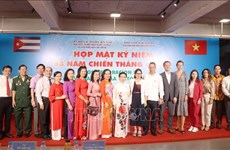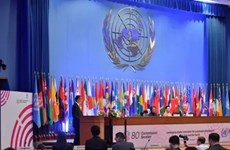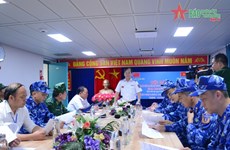UN Human Rights Council endorses Vietnam’s UPR
The United Nations Human Rights Council
on Sept. 24 endorsed Vietnam’s national report under the Universal
Periodic Review (UPR) mechanism at a session that drew the
participation of representatives of all 192 Council members, and
international and non-governmental organisations.
The United Nations Human Rights Council
on Sept. 24 endorsed Vietnam’s national report under the Universal
Periodic Review (UPR) mechanism at a session that drew the
participation of representatives of all 192 Council members, and
international and non-governmental organisations.
Addressing the function, first Vice Minister for Foreign Affairs of Vietnam Pham Binh Minh thanked States, international organisations and some non-governmental organisations for their objective remarks and goodwill comments on Vietnam’s efforts and accomplishments in the protection and promotion of human rights.
He reasserted Vietnam’s ultimate goal in its efforts to promote human rights which is to develop a “prosperous people, strong country, and a just, democratic and advanced society.”
“The promotion of democracy and human rights are both the goal and the driving force of our reform process,” the vice minister said.
He emphasised that towards the goal, Vietnam has over recent years continued to reinforce the legal framework needed for better protection and promotion of human rights along with enhancing the participatory system of inspection and monitoring in accordance with the rule-of-law principle and better ensuring the civil, political, economic, social and cultural rights of the people.
Minh underscored political, historical, social, cultural, religious and ethnic particularities of each nation in the common cause to protect and promote human rights.
Accordingly, the State bears the primary responsibility to do what is needed for the interests of the nation and people and need to take necessary measures to maintain social and political stability for development, he said.
“In this connection any activity that violates the law and threatens this fundamental interest of the nation should be punished in accordance with the law,” he stressed.
The Vietnamese representative took this occasion to provide the participants with a better understanding of some issues that have drawn the attention of many states.
Regarding the press, the vice minister underlined its essential role in the development of every society, including Vietnam.
“Vietnam facilitates the development of the press by creating an increasingly comprehensive legal framework and favourable policy environment in which freedoms of press and expression are protected,” he said.
“Vietnam is currently working to amend its Press Law and promulgate new regulations to better ensure these rights of the people, in a manner that best suits the cultural values and traditions of the Vietnamese society and conforms with international law,” he added.
Minh also once again reasserted Vietnam’s policy on religious freedom, highlighting the country’s special incentives and preferential treatment for ethnic minorities to facilitate their development and assist them in preserving their cultural values and languages.
“Thanks to this policy, religious and belief activities have been able to grow rapidly, particularly during the last 35 years,” he stressed.
Commenting on Vietnam’s national UPR report, representatives of states all spoke highly of the country’s achievements in the enforcement of human rights.
They praised Vietnam’s seriousness, cooperation, openness, and eagerness to share experiences with other countries in the implementation of human rights.
Cuba, Venezuela and Russia considered Vietnam’s approach to and resolution of human rights issues as exemplary ones for other countries to study.
Brunei recognised Vietnam’s active role in laying out a human rights mechanism for the Association of Southeast Asian Nations (ASEAN), contributing to endeavours to protect and promote human rights in the region.
Thailand hailed Vietnam for providing other countries with valuable experiences in fully implementing the rights of the people while Algeria considered Vietnam’s achievements and methods to conduct UPR as a practical contribution to the Human Rights Council’s operating mechanism.
Many of the NGOs highly valued successes the country has recorded in a wide range of fields, particularly in eradicating hunger and reducing poverty and socio-economic development.
The World Peace Council recognised that despite suffering war consequences, Vietnam has made numerous strides to ensure fundamental human rights, including civil rights, the rights to freedom of religion, belief, and expanded democracy. It highlighted live broadcasts of question-and-answer sessions of the Vietnamese National Assembly.
The International Association of Democratic Lawyers (IADL) and the Europe-Third World Centre (CETIM) appreciated Vietnam’s significant achievements in the protection of human rights in all areas, calling the Human Rights Council to pay attention to the victims of Agent Orange.
The Nord Sud XXI organisation viewed Vietnam as an example for other countries to follow and called on UN members to assist the Southeast Asian country with appropriate resources and in the spirit of cooperation./.
Addressing the function, first Vice Minister for Foreign Affairs of Vietnam Pham Binh Minh thanked States, international organisations and some non-governmental organisations for their objective remarks and goodwill comments on Vietnam’s efforts and accomplishments in the protection and promotion of human rights.
He reasserted Vietnam’s ultimate goal in its efforts to promote human rights which is to develop a “prosperous people, strong country, and a just, democratic and advanced society.”
“The promotion of democracy and human rights are both the goal and the driving force of our reform process,” the vice minister said.
He emphasised that towards the goal, Vietnam has over recent years continued to reinforce the legal framework needed for better protection and promotion of human rights along with enhancing the participatory system of inspection and monitoring in accordance with the rule-of-law principle and better ensuring the civil, political, economic, social and cultural rights of the people.
Minh underscored political, historical, social, cultural, religious and ethnic particularities of each nation in the common cause to protect and promote human rights.
Accordingly, the State bears the primary responsibility to do what is needed for the interests of the nation and people and need to take necessary measures to maintain social and political stability for development, he said.
“In this connection any activity that violates the law and threatens this fundamental interest of the nation should be punished in accordance with the law,” he stressed.
The Vietnamese representative took this occasion to provide the participants with a better understanding of some issues that have drawn the attention of many states.
Regarding the press, the vice minister underlined its essential role in the development of every society, including Vietnam.
“Vietnam facilitates the development of the press by creating an increasingly comprehensive legal framework and favourable policy environment in which freedoms of press and expression are protected,” he said.
“Vietnam is currently working to amend its Press Law and promulgate new regulations to better ensure these rights of the people, in a manner that best suits the cultural values and traditions of the Vietnamese society and conforms with international law,” he added.
Minh also once again reasserted Vietnam’s policy on religious freedom, highlighting the country’s special incentives and preferential treatment for ethnic minorities to facilitate their development and assist them in preserving their cultural values and languages.
“Thanks to this policy, religious and belief activities have been able to grow rapidly, particularly during the last 35 years,” he stressed.
Commenting on Vietnam’s national UPR report, representatives of states all spoke highly of the country’s achievements in the enforcement of human rights.
They praised Vietnam’s seriousness, cooperation, openness, and eagerness to share experiences with other countries in the implementation of human rights.
Cuba, Venezuela and Russia considered Vietnam’s approach to and resolution of human rights issues as exemplary ones for other countries to study.
Brunei recognised Vietnam’s active role in laying out a human rights mechanism for the Association of Southeast Asian Nations (ASEAN), contributing to endeavours to protect and promote human rights in the region.
Thailand hailed Vietnam for providing other countries with valuable experiences in fully implementing the rights of the people while Algeria considered Vietnam’s achievements and methods to conduct UPR as a practical contribution to the Human Rights Council’s operating mechanism.
Many of the NGOs highly valued successes the country has recorded in a wide range of fields, particularly in eradicating hunger and reducing poverty and socio-economic development.
The World Peace Council recognised that despite suffering war consequences, Vietnam has made numerous strides to ensure fundamental human rights, including civil rights, the rights to freedom of religion, belief, and expanded democracy. It highlighted live broadcasts of question-and-answer sessions of the Vietnamese National Assembly.
The International Association of Democratic Lawyers (IADL) and the Europe-Third World Centre (CETIM) appreciated Vietnam’s significant achievements in the protection of human rights in all areas, calling the Human Rights Council to pay attention to the victims of Agent Orange.
The Nord Sud XXI organisation viewed Vietnam as an example for other countries to follow and called on UN members to assist the Southeast Asian country with appropriate resources and in the spirit of cooperation./.











